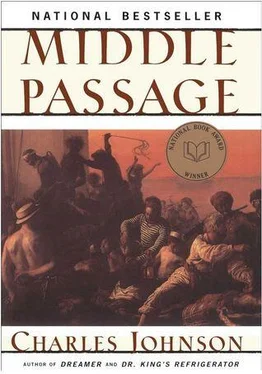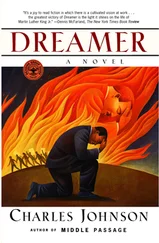You cannot know the feeling, nor words deliver the fact, of how I felt once flung into the Cupboard. My eyes were logged, full of freezing water. Still, I was able to make out the ship rolling onto her beam ends. Her stern sank foremost. I slipped underwater, the sea filling my throat, ballooning my lungs — it was a feeling of inversion, as if I’d mistakenly touched a harmless-looking wall, thinking it solid, then tripped, falling through into a shadowy realm of mist and specters on the netherside. Drowning, I saw my past spool by me, a most unsettling experience, there being in my case precious little of value to review. My lungs were bursting. I found myself following the broken ship; she was clearly before me, only ten cables below, her carcass suspended like an antique bark hung from a museum’s ceiling, as were my shipmates, their lips bubbling ribbons of air. I batted my hands frantically to get back, my fingers scratching at the bottomside of the Atlantic and, surfacing, shaking water from my eyes, I saw chests, water casks, and debris crowded with quaking bilge rats floating near me and threw myself upon a hammock lashed in the orthodox way, with seven hitches. Likewise, some of the Allmuseri were gripping loose deckboards, furniture, and shrouds awaft round the hulk of the Republic. But not for long. The speed of the ship’s descent quickly dragged them down at the rate of knots. Husbands, fighting to keep afloat, called their wives, but in the black bowl of sky, and blacker sea, no one could identify another, and soon their chins flipped up and disappeared in a sparge of foam.
In principle, the hammock should have kept me floating for a full day. It did not. During the night, the shipwrecked went under, one by one. Who lived, I could not say, for the hammock beneath me grew heavy and at last, filling with salt water, surrendered its weight and mine into the Atlantic’s dancing, lemon-colored lights.
Entry, the ninth AUGUST 20, 1830
Here the log of the Republic —and my life — might have ended. Stouter men than myself, even eighteen stone, might have proven more buoyant, but seeing how thin I’d become, and weakened by bloodletting, I found myself floundering until, miraculously, I was fished from the sea. Arms stronger than mine pulled me over poop-deck beams. Someone’s hand seized me by the hair, and my half-drowned body was hauled aboard what looked like the deck of a ship built for Andrew Jackson himself. Fingers on both sides of me pushed forward, forcing water through my lips, and unless I was deceived there were crewmen and elegantly dressed passengers gathered round me, the cook, and three children yanked from the waves — a ring of pale, insubstantial faces, one of which peered through a lorgnette and asked in Creole patois, “What kind of fish are they?” for our condition was so horrible our own mothers would not have known us. By contrast to these spectators, we must have seemed like wharf rats and wretches. We smelled worse. Our scalps were full of worms. Although these passengers appeared to be polite society, I had no inkling of the sort of vessel we were aboard, which was just as well, as I shall soon explain, and my gratitude at being rescued was so great I would not release their captain, a kindly old shellback named Cornelius Quackenbush, for nigh half an hour, and once he uncoiled my fingers from his cuffs I clung, legs and arms, to the cathead until I slipped into a swoon.
When my senses returned or, if that is saying too much, when I again opened my eyes, I discovered Captain Quackenbush’s crew had carried Squibb and me to a comfortable berth, and the children to another nearby. Little by little, I learned that this ship, the Juno, was a floating gin palace, as some sailors called them, with gold plates in the galley and Royal Wilton carpets that cost five dollars a yard, and that when she sighted us during her return to New Orleans from the West Indies our wreck was adrift only a few leagues southwest of Guadeloupe. Captain Quackenbush received us with a welcome that spoke well of his sympathy for all sailors, closing his eyes as Squibb recounted the tale of our misfortunes, then bowing his head to thank the Author of All Things for selecting him to be the agent of our rescue.
So yes, Quackenbush fed, bathed, and treated us kindly for days after our deliverance, but I still felt myself to be thousands of miles from anything I felt sure about. Furthermore, I never dreamed how the full weight of all we’d endured would hit me like a falling masthead: I felt like a foot soldier home from a foreign campaign. As a crew member on the Republic, I’d learned to live each day as if it might be my last. Anyone who served under Ebenezer Falcon woke each morning with a prayer on his lips, preliving his final hour and different ways he might die. During a storm, you could never relax, be overconfident, or let fear show upon your face. You developed what Cringle called a “flood mentality”—that is, you were always prepared to have water high as your waist. During each crisis, every action had to be aimed at helping your fellow crewmen. You could not afford to tire. Your duty was always to insinew your ship; if you hoped to see shore, you must devote yourself to the welfare of everyone, and never complain, and constantly guard against showing weakness. Looking back at the asceticism of the Middle Passage, I saw how the frame of mind I had adopted left me unattached, like the slaves who, not knowing what awaited them in the New World, put a high premium on living from moment to moment, and this, I realized, was why they did not commit suicide. The voyage had irreversibly changed my seeing, made of me a cultural mongrel, and transformed the world into a fleeting shadow play I felt no need to possess or dominate, only appreciate in the ever extended present. Colors had been more vivid at sea, water wetter, ice colder. But now. .
Ah, now, I felt shock waves long postponed. I could not stop shaking. I wept easily, and found this involuntary exercise so refreshing I promised to empty myself and wet my handkerchief this way every week, say, at elevenish on Sunday evenings, so don’t bother to call on me then. Yet the simplest tasks defeated me. When called upon to select from bedclothing volunteered by the passengers and brought by the ship’s boy, who asked, “Do you prefer white bedspreads or blue?” I was paralyzed, first because he reminded me of Tommy, and second because I could see no difference between the two choices after our travels, or how the distinction mattered in the Grand Scheme of things, and I pondered this astonishing question for a quarter-hour, incapable of choosing until Squibb said, “Blue,” and bailed me out. These embarrassments did not abate. Trays of food brought to our room each morning — all those culinary options — gave pause to a man who had lately dined on his first mate and quartermaster.
But that was not the worst of it.
I could not sleep for more than four hours at a stretch, not after being trained to catnap by Falcon, who kept me up for midnight watches. Nightmares of the African god pestered my sleep. Now and then I felt the Juno was sinking, and I fell to the floor, forcing a laugh when I got to my feet so Squibb wouldn’t worry, but he saw the state I was in all the same. Saw it when I fabricated excuses for not leaving our cabin the first week, and the week after that. Saw it when I stood naked, having forgotten to dress, behind the long curtain at our porthole, which I kept drawn, peeping out at carefree people dining and courting on deck and, Lord help me, I wondered how they might taste — people, I heard, preparing for a shipboard wedding; people who hungered and hated, plotted and schemed over a thousand inconsequentials. Hardly trivial to them, I knew, because not all that long ago such matters as getting a good-looking woman into bed and making a Big Killing and keeping up with the latest stage play and buying clothes and cutting a swell figure had consumed my energies as these activities did theirs; but I simply could not do this now. None of it made sense after the Middle Passage. And I wondered: How could I ever live on land again? Often the depression was so great I felt guilty simply for being alive. By surviving, I sometimes felt I’d stolen life from Cringle, or was living on time belonging to Ngonyama and the other mates; I felt like a thief to the bitter end. Sometimes late at night, after Squibb, his arm in a sling, went rummaging outside for a horn of rum, I considered how easy it would be, and perhaps just, to join my drowned shipmates by hanging myself. And of course it didn’t help that passengers, partying after the storm passed, chose to sing a chantey called “Have You Ever Been in New Orleans.”
Читать дальше












